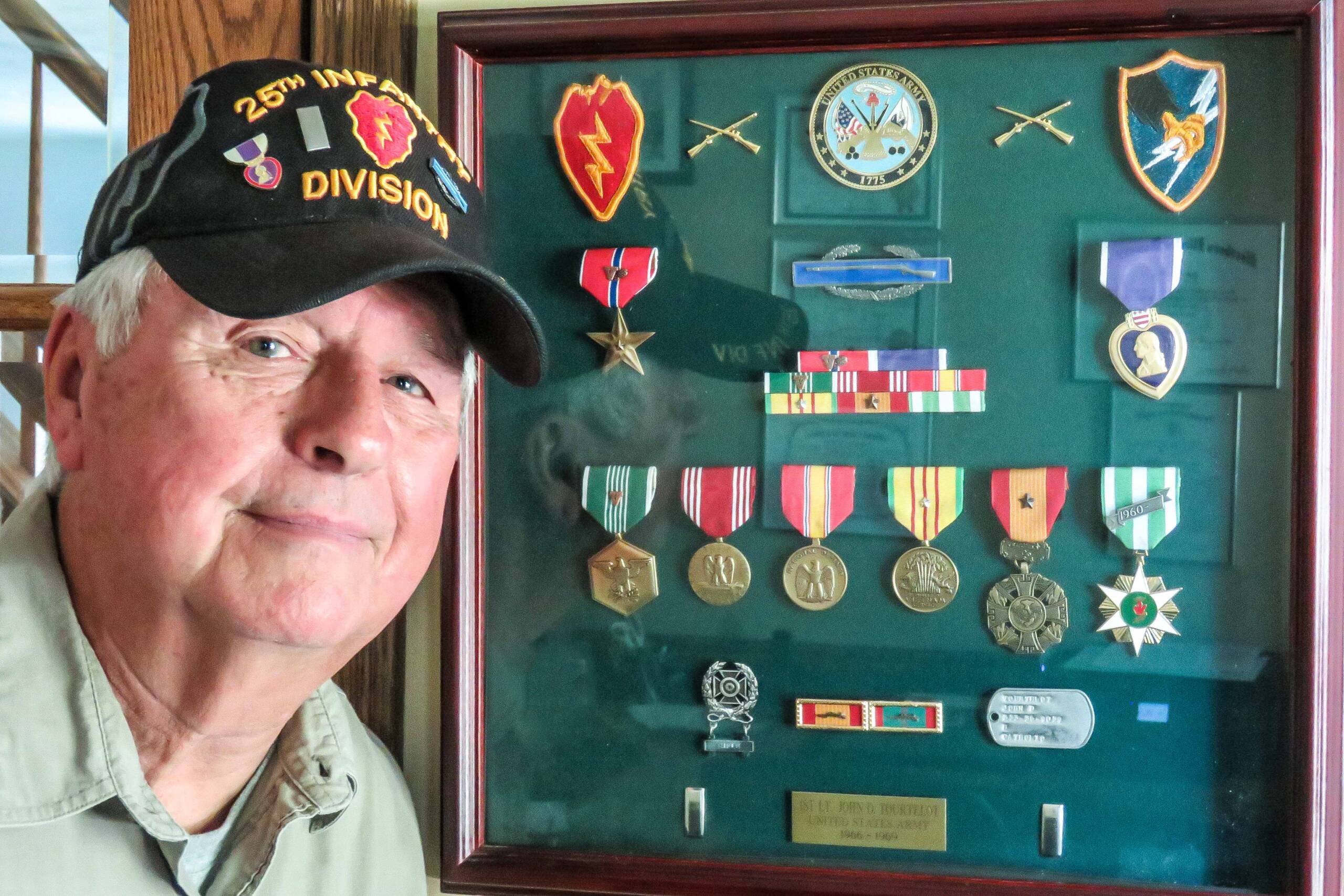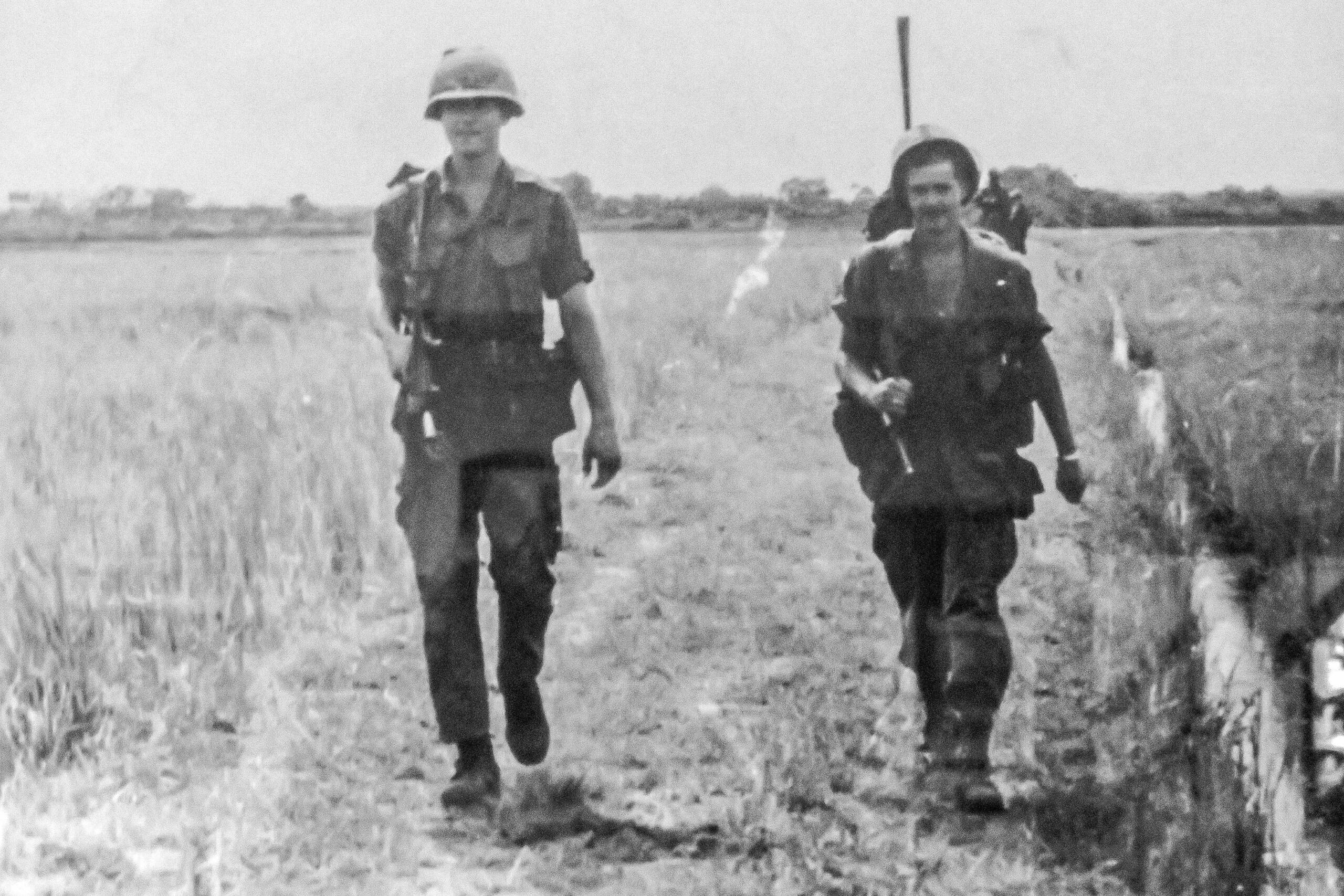Army Vietnam War Schaumburg, IL Flight date: 10/19/22
By Carla Khan, Honor Flight Chicago Veteran Interview Volunteer
The son of a WWII Veteran and brother to 3 sisters, John Tourtelot grew up in Oak Park, IL. After his graduation from Oak Park High School, he attended Wright Jr. College where, in his own words, “he was not an overly dedicated student and had a pretty good time.” Therefore, when his draft notice arrived, it was not a very big deal to him. Rather than being drafted, he opted to enlist and selected the Army Signal Corps “because they had the coolest patch.” Basic Training was at Fort Leonard Wood MO. followed by AIT (Advanced Individual Training) at Fort Gordon, GA. None of it was very challenging to John, and since a higher rank also meant an increase in pay, he applied for Officer Candidate School (OCS) and was accepted at Fort Benning, GA, in 1967. The training he received here taught him discipline and leadership and gave him direction. All were very valuable skills that John said served him well many times during his military service as well as in his entire civilian career.
After OCS, John was sent to Ft. Ord, CA, for about 6 months where he was assigned to a Basic Training company. His next assignment was with the 25th Infantry Division as an infantry platoon leader in Vietnam. After landing at Tan Son Nhut AFB without either much of a warning or any orientation, this brand-new leader was immediately transported by helicopter to his next base, Tay Ninh, to meet and lead his platoon consisting of approximately 38 men most of whom already had been battle hardened. Fortunately, John had the advantage of having been in the service as an enlisted man himself and could relate to them. He told them that he was brand-new and asked that, if he did something wrong or needed to learn something, they’d tell him. And most importantly, he said, his goal was that “all of us will go home safely.” Many of his soldiers were only 18 years old and the responsibility for them was a heavy load on the shoulders of John, a 20-year-old 2nd Lieutenant. Only one soldier challenged him by walking very, very slowly when they were on patrol, stringing the group out way too far. John noticed, did not argue and instead assigned the soldier to the very last spot in line where he could go as slowly as he wanted. Of course, the soldier figured out quickly enough that if he was all by himself, he’d lost the protection of the group. Problem solved.
On the third day after his arrival in Tay Ninh, John and his platoon along with other platoons (a total of approximately 175 men) were flown out to build a new fire base. Their equipment consisted of shovels and sandbags. While a group performed safety sweeps all day, the others built the standard camp starting with a trench of about ½ block square, digging bunkers and covering those with corrugated metal sheets for a roof. Sandbags and a barbed wire fence were placed all around for protection. The entire construction took about a week; every three months they moved to a different location. Potable water was flown in along with C-Rations. Iodine drops had to be added to the water for purification. A special, although not authorized trick, was to heat canned food up with a little bit of ordnance. The captains frowned upon this but “heated spaghetti tastes so much better than cold.” Because there were, of course, no laundry facilities, clothes were worn for weeks till a helicopter dropped off a clean supply to swap out. When it rained, they’d get soaking wet and just had to wait till they dried up again, because all the soldiers had was what they could carry in their backpacks. Since the camps often were located in swampy areas with rice paddies, rivers had to be crossed during patrols and a leech-check was needed after every crossing. Once in a safe area, they all stripped, checked for leeches, removed them with insect repellent or even burning matches. John, equipped with his dad’s huge army knife, used this to scrape them off.
Life in the camps was difficult and rough but John felt that he’d had adequate training mostly focusing on “you have no choice, just do it.” For instance, lack of sleep often happened because they had to take turns at the listening post to listen for unusual noises; one platoon was always out at night. At all times, they had to be aware of the enemy. A giveaway was the scent of marijuana that the VC soldiers smoked to give them courage. Once that was noticed, the cannon barrels were lowered and shots were fired with hundreds of so-called flechettes, which were little arrow or fishhook types of ammo that sometimes also carried explosives. After one such battle, John went over to the abandoned enemy territory and noticed a VC soldier, “a little guy, not more than about 12 years old” who had been killed. As John said, “it was only a kid but he was carrying a gun and would have killed us; I hope his comrades came and buried him.”


The Cu Chi area was known for its vast system of tunnels widely used by the enemy. Every platoon had a so-called “tunnel-rat,” usually a soldier of short stature who’d enter a nearby tunnel and check it out. On one occasion, John decided to go and see for himself what a tunnel was like. After he’d been underground for a while, he noticed a thin trip wire that would set off a bomb when touched. He quickly turned around and reported the bomb, which was detonated. On another occasion while on security patrol, his unit was ambushed. They exchanged fire and John saw a relatively slow-moving RPG (rocket propelled grenade) coming directly at him, but there was no place to hide. Fortunately, the RPG got stuck in the dirt and didn’t explode. Another near miss for John. Once, during a big firefight an ammo dump blew up tossing everything and everyone into the air. He wasn’t always that fortunate and did incur injuries that earned him a Purple Heart medal. In addition, John also received a Bronze Medal and the Vietnamese Cross of Gallantry.
Cheering the soldiers up was a very important communication with home. Care packages were always enthusiastically welcomed and shared. John said that his mother used to send big containers with goodies. During down-time, after a sweep and before nightfall, they’d write letters home. Another means of communication was speaking messages into small cassette recorders and sending those back and forth. Just recently, John discovered a couple of cassettes in an old box. A friend transferred the data onto CDs and suddenly the past became alive when he heard his mother speak and when he heard his own messages with gunfire in the background. Holidays were hardly marked, but John recalled being on security detail under a bridge they had blown up and seeing a tiny Christmas tree in the debris. It probably also was the only time they had a hot meal delivered.
When it was John’s turn to go home, he flew to Los Angeles where he stayed with his sister for a few days. From his haircut and probably his demeanor, it was obvious that he was military and was not welcome in the crowd. He was greeted with snide remarks such as “baby killer.” He shrugged it off with the thought that he had owned up to his responsibilities for his country. Being back in his parental home was a wonderful experience along with seeing family, old friends, and just going to the store. However, it apparently took him a while to adjust; according to his mother, he slept the first couple of months on the floor instead of in his bed. And similarly, for many years afterwards if the temperature and the humidity levels were high, wherever he was, the sound of helicopter blades would transport John back to his time in Vietnam and without fail, he could almost smell the Jet-A airplane fuel.
Since he still had a few months to finish his contract, he briefly considered going for helicopter pilot training because he really liked flying, but then realized that he undoubtedly would be sent back to Vietnam and that he shouldn’t push his luck. Instead, as an Infantry Officer, John was dispatched to Accounting School at Ft. Benjamin Harrison, IN. where he dutifully completed his service time.
When John finally returned to the Chicago area, he took advantage of the GI Bill and earned his BA in English with a minor in Journalism. Again, at college, he was harassed by anti-war protesters who would lie on the ground in front of the university’s doors. John, who had met fiercer enemies, responded by stepping right on their bodies thinking, “he had honorably fulfilled his obligations to his country and these people had no business messing with him.” Along with his degree, the best result of his college time was that he met Kathy, whom he married in 1973. They have been happily married ever since, have 3 children and enjoy their 6 grandchildren. They are looking forward to celebrating their 50th anniversary in the very near future.
After earning his degree and planning his marriage, John needed a job and was offered a position with the Arlington Heights, IL Police Department where he served as a Sergeant for the next 20 years.
Eventually, when he was looking for “something to do”, Kathy suggested he go to law school. He earned his Law degree, worked for a law firm and was a Municipal Prosecutor for Schaumburg and Prospect Heights, I., until 1995 when he became a Judge for the Cook County Circuit Court until 2014.
John finally is slowing down a little but still is on the board of several organizations and also volunteers for Travelers Aid Chicago at O’Hare airport. His life’s philosophy is, “It doesn’t matter what you do, as long as you do it with a good, kind heart!”
John, thank you for your courageous and dedicated service to your country. Enjoy your well-deserved day of honor on the 106th flight of Honor Flight Chicago. Welcome Home!


